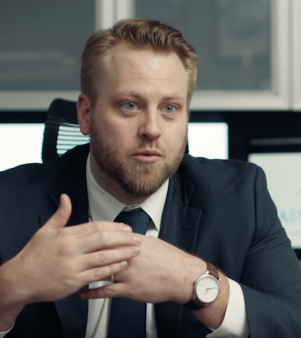
We trust doctors, nurses, and other medical personnel to provide us with compassionate and responsible medical care when we are injured or ill. When they fail to provide an acceptable standard of care, a medical condition could worsen, an injury could occur, or the patient could die.
One study from Johns Hopkins University found that medical errors are the third-leading cause of death in the U.S. Even when medical errors aren’t fatal, they can leave patients with lifelong injuries and significant expenses.
If you’ve been the victim of medical malpractice, call the Lawrenceville medical malpractice lawyers at Cain Injury Law. Our personal injury attorneys are known for their commitment to our local communities. We’ve also received widespread recognition from our peers, including being named to The National Trial Lawyers’ Top 40 Under 40 list.
To learn more about how we can help you with your medical malpractice case, you can call our office in Lawrenceville, talk to us via live chat, or visit our contact page.
What Is Medical Malpractice and Who Can Be Liable?
Medical practitioners sometimes make mistakes, but not every medical error necessarily qualifies as malpractice. To be considered malpractice, the actions of the doctor or other medical professional must fail to meet the standard of care they’re required to provide and have directly led to your injuries. For example, if your doctor made a mistake, but you cannot show that their error caused your injuries, their actions might not be considered malpractice.
Doctors are not the only parties who can be liable for medical malpractice. Anyone who’s involved in any stage of your medical care could potentially be held liable if they make a mistake that leads to you being injured.
People and Institutions Who Can Be Held Liable For Malpractice Include
- Nurses
- Lab technicians
- Hospitals and other medical facilities
- Medical device manufacturers
- Pharmacists and pharmacy technicians
- Paramedics and other emergency medical personnel
- Physical therapists
- Pharmaceutical companies
Common Types of Medical Malpractice
Medical malpractice covers a wide range of accidents and injuries. Some of the most common types of medical malpractice include:
- ER malpractice – Emergency room doctors and nurses may fail to order adequate tests, leading to a missed diagnosis or delayed diagnosis. Other examples of ER malpractice include inadequate monitoring, surgical mistakes, and laboratory errors, among others.
- Hospital malpractice – Hospitals can be held liable when their employees make mistakes. Some examples of hospital malpractice include negligent hiring or staffing by the hospital and mistakes such as medication errors, surgical errors, not ensuring patients are adequately monitored, ordering incorrect or unnecessary tests, incorrectly interpreting lab work and other tests, diagnosis errors, etc.
- Anesthesia errors – Patients need to be monitored extremely carefully when they’re under anesthesia, as anesthesia errors can do extensive harm. If a patient isn’t entirely under anesthesia when they’re being operated on, they may feel excruciating pain without being able to respond or indicate that there’s a problem. On the other end of the spectrum, a patient who’s put too far under may slip into a coma and have difficulty waking up if they’re able to wake up at all.
- Medication errors – Doctors and pharmacists need to exercise care when prescribing and administering medications. If they aren’t careful enough, a patient may take the wrong medication or take the wrong dose of the correct medicine. Taking incorrect medication or taking the proper medication at the wrong dose can cause a wide range of harmful side effects. Furthermore, patients who receive incorrect medication may see their initial condition worsen because they aren’t getting the right medicine.
- Misdiagnosis or delayed diagnosis – A misdiagnosis is when someone is incorrectly diagnosed with the wrong illness. A delayed diagnosis is when doctors fail to figure out what’s wrong with a patient in a timely manner. A misdiagnosis can worsen a patient’s condition because they’re being treated for the wrong illness. A delayed diagnosis can have similar effects because the patient’s disease continues to go untreated as the delays mount.
- Birth injuries – Developing fetuses and newborns are especially susceptible to injury, so doctors and other medical professionals need to be extremely careful. Failing to order a timely C-section, being too forceful with forceps and other tools, being too rough during labor and delivery, failing to monitor a mother and her child adequately, and other mistakes can have lifelong effects on a baby’s development.
- Surgical errors – Surgical errors — including wrong-side surgeries, wrong-site surgeries, surgeries performed on the wrong patient, etc. – can have severe, lifelong implications for malpractice victims.
- Radiological errors – Results from X-rays, MRIs, CT scans, and other radiological tools need to be interpreted correctly if patients are going to get the treatment they need. Radiological mistakes can lead to delayed diagnoses, misdiagnoses, and other serious problems.
- Lab errors – Just as with radiological imaging, blood work, and other lab tests can cause significant harm if mistakes happen. Lab errors include misdiagnoses, delayed diagnoses, technicians mixing up test results for different patients, and so on.
What Do You Have to Prove in a Medical Malpractice Claim?
Medical malpractice claims are different from other personal injury cases because there’s a higher standard of proof. To prove a doctor or other medical professional is liable for malpractice, you have to show that their actions violated the medical standard of care.
You’ll have to demonstrate that the defendant’s actions did not line up with what another medical professional in a similar situation, with a similar level of training and experience, would have done. Once you’ve established that, you’ll also have to show that the defendant’s actions directly led to your injuries.
Because the standard of proof in these cases is so high, it’s essential to get help from an experienced medical malpractice attorney. An attorney can request and review your comprehensive medical records and hire knowledgeable, highly qualified medical professionals who can testify as expert witnesses and explain what a competent medical professional would have done to provide you with the safe care you needed and how a lack of competent care led to your injuries.
In addition, your attorney can gather information, such as pay stubs, medical bills, and testimony from family and friends to show the extent of the losses you suffered from medical expenses, lost wages, and pain and suffering.
Process for Filing a Medical Malpractice Claim in Lawrenceville
Broadly speaking, Georgia’s medical malpractice claims process is the same as it is in most other states. There are a few legal requirements for medical malpractice cases in Georgia that other states do not have, though. The most important of these is that when you file your initial complaint in court, you’ll also need to submit an affidavit from a qualified medical expert.
This affidavit will need to include a description of at least one negligent act on the part of the medical provider or facility you’ve filed your claim against, as well as the medical expert’s factual basis for how they reached their conclusion. Without this affidavit, your case will likely be dismissed, though you may get a chance to refile your claim with a correct affidavit.
Settling a Medical Malpractice Case in Lawrenceville
Most medical malpractice cases are settled out of court, as this lets malpractice victims avoid a costly trial and the risks that come with it. Before accepting any settlement agreement, though, be sure to speak to an attorney, so you know that you’re getting a fair deal.
Since agreeing to a settlement generally means you give up your right to pursue a lawsuit later on, you want to be sure the settlement covers your medical bills and any other expenses you may have.
How Our Lawrenceville Medical Malpractice Lawyer Can Help You
The complexity involved in medical malpractice cases means most people need help from a knowledgeable and experienced malpractice lawyer. Our malpractice attorneys can help with your claim by:
- Preparing the initial complaint and affidavit from a qualified medical expert
- Gathering evidence to support your claim
- Identifying the full extent of your losses to maximize the value of your claim
- Handling all the paperwork and documentation involved in your claim
- Negotiating with the medical providers and facilities involved for a settlement that reflects the full extent of your losses
- Bringing your case to court if a fair settlement can’t be reached
Time Limits for Filing Medical Malpractice Lawsuits in Georgia
There are two critical deadlines for filing a medical malpractice lawyer in Georgia. In most medical malpractice cases, you have two years from the date of your injury (that is, when the malpractice occurred) to file a lawsuit. However, if the injuries from medical malpractice don’t manifest right away, you generally have two years from when you discover or reasonably should have discovered them.
If it’s been more than five years since the malpractice, though, you will most likely be unable to file a lawsuit. This is true even if the damage from the doctor’s negligent actions didn’t show up right away.
Pursuing Full Compensation for Your Medical Malpractice Case
Medical malpractice can take a substantial physical, emotional, and financial toll on victims. Through a malpractice insurance claim or lawsuit, you can recover compensation for:
- Your past and future medical bills
- Your physical pain and suffering
- Your emotional suffering
- Your lost wages and reduced ability to earn a living because of your injuries
Georgia used to have a cap on non-economic damages you could receive through a medical malpractice claim. However, the state Supreme Court struck down this cap in 2010, deeming it unconstitutional. A knowledgeable personal injury lawyer can help you understand your rights and seek the maximum financial recovery for your injuries.
Talk to a Lawrenceville Medical Malpractice Attorney Now
The effects of a medical malpractice injury can last for a lifetime, but that doesn’t mean you can’t seek justice for what happened to you. Our medical malpractice attorneys at Cain Injury Law are committed to helping you seek the compensation you need to put your life back together as best you can.
Get a free and confidential case review by calling our office in Lawrenceville, visiting our contact page, or speaking to us on live chat.










 Site by Consultwebs.com: Personal Injury Law Firm Website Designers/Lawyer Marketing.
Site by Consultwebs.com: Personal Injury Law Firm Website Designers/Lawyer Marketing.